In recent years, non-dairy milks have become extremely popular as an alternative to traditional dairy milk. They have great flavors, textures, and additional nutrients. Though these plant based beverages are all suitable for a vegan or plant based diet, some varieties are best for those with nut allergies, gluten intolerances, celiacs disease, insulin sensitivities, or health conditions.
Soy milk is one of the healthiest non-dairy milks available. Additionally, pea milk, hemp milk, quinoa milk, and flax milk are all ranked as top healthy cow milk alternatives. Rice milk, spelt milk, oat milk, almond milk, and coconut milk are healthy non-dairy milk options in more limited amounts. Fortified and enriched plant based beverages should be your preference, with a focus on added vitamins and nutrients.
Whether you are looking for a sweet non-dairy milk for your cereal or a high protein choice for your post workout shake, this article will help you decide which is the best non-dairy milk for you.
What is "Healthy" Non-Dairy Milk?
Although non-dairy milk is considered a healthy alternative to traditional cow milk, not all plant based alternatives are made the same.
There are a variety of differences between their ingredients lists and how those translate into calorie, fat, nutrient, and protein differences.
Soy milk is widely regarded as the top choice, considering taste and texture, as well as vitamin and nutrient content.
A close second in healthy non-dairy beverages is pea milk. Both of these options are high in protein and nutrients.
We have compiled some basic tips that you need to know when choosing the healthiest non-dairy milk:
- Products with fewer ingredients are usually better for you
- Limit your intake of additives, preservatives, and artificial flavors
- Choose organic when possible
- Opt for unsweetened options. Sweetened milk can have high levels of sugar
- Look for fortified or enriched blends with additional: calcium, vitamin D, vitamin A, phosphorus, magnesium, potassium, iron, B vitamins and/or vitamin E
- Find a blend with high protein or added protein in the form of pea protein powder
- Use different plant milks for different things!
Let's break down that last tip.
Some plant milks are higher in sugar content (especially when sweetened or vanilla flavored), while some are very low calorie.
Creamy blends, like oat milk and coconut milk, are great for baking.
Thinner, more watery varieties, like spelt milk, almond milk, and rice milk, are better low calorie options.
Those who need extra protein should select pea milk or soy milk.
In order to make your decision easier, we've put together a list of the 10 healthiest non-dairy milks according to their nutritional profile.
Our list takes into account the plain versions of each milk. Certain brands use additives and preservatives in their product which can make a "healthy" non-dairy milk less healthy. Always read your nutrition labels!
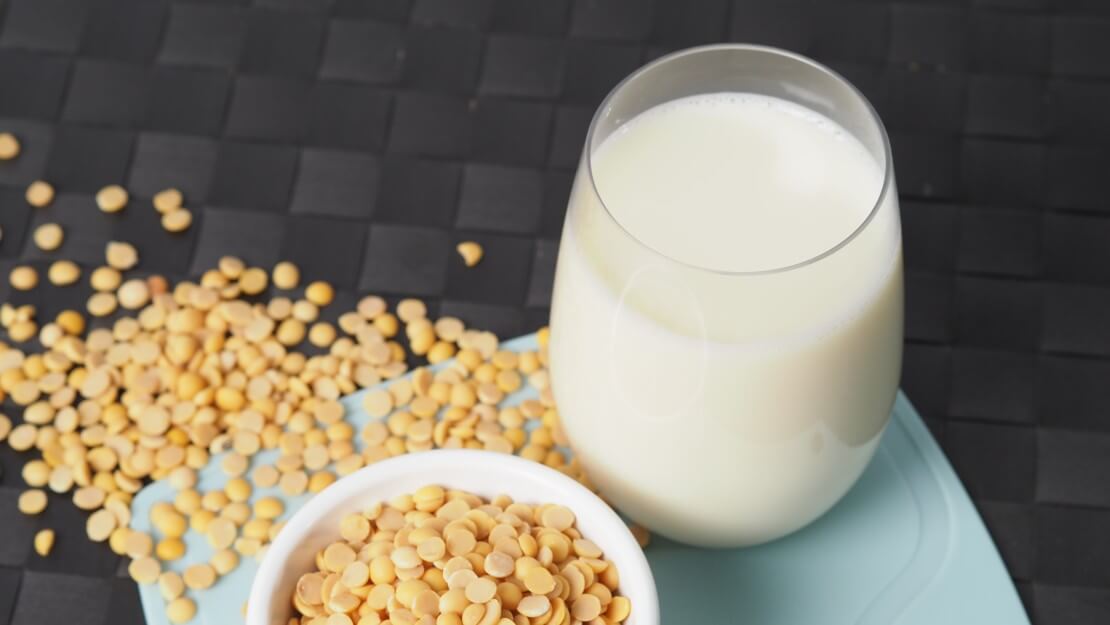
1. Soy Milk
The first pick on our list of the healthiest non-dairy milk is soy milk. Not only is the texture and taste of soy milk very similar to dairy milk, there are additional benefits due to its nutrient content.
Some soy milks are sweetened or flavored, increasing their calories, but they generally have relatively low calorie contents.
Of all the non-dairy milks, soy milk ranks the highest in protein.
Protein is vital for building muscle and is necessary for the healthy functioning of the body. Many elite athletes swear by soy milk to help them gain muscle and endurance.
Some soy milk varieties contain added protein, in the form of pea protein. This makes them great for vegans and vegetarians looking for a high protein milk.
Also, many soy milks are fortified with additional calcium, potassium, iron, and B vitamins, sometimes even more calcium than is found in cow milk!
Additionally, soy beans have all 9 amino acids essential to human health. Soy milk is low in cholesterol and fat, making it heart healthy. If you want a milk that has a variety of nutrients, enriched soy milk is the way to go.
While soy is nutrient-rich, it's slightly controversial. Some people believe it mimics the effects of estrogen, and soybeans are often genetically modified. You can learn more about the pros and cons of soy here.
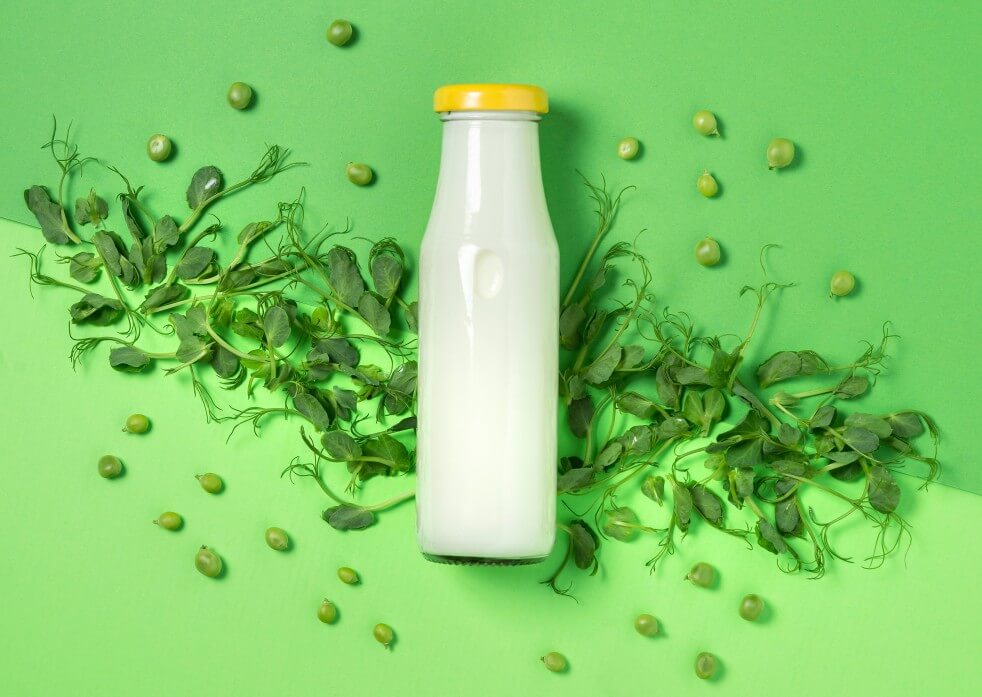
2. Pea Milk
Pea milk is a great dairy milk alternative because it is one of the most similar to traditional cow milk in nutritional content. Most other non-dairy milks that include added protein actually use pea protein as the additive source.
Pea protein is high in protein, with some brands containing 8 grams per cup, identical to the content in cow milk.
Protein rich foods help you build muscle, maintain endurance, and feel full. Pea protein can be enriched with branch chain amino acids (BCAAs) that have been proven to promote muscle growth and regulate blood sugar.
Some pea milks can contain high levels of oil, so pay attention to the nutrition label.
While you're checking the label out, take notice of whether the product contains important nutrients like:
- Potassium
- Iron
- Calcium
- Vitamins A and D
- Omega 3 and omega 6 fatty acids
All of these make pea milk good for weight loss, brain development and heart health.
These enrichments help boost pea milk to the top of our list for top healthiest non dairy milks.
Pea milk can be lower in calories than cow milk, but it's still creamy and delicious. Some varieties are sweetened or flavored, but they still may be lower in calories than cow milk.
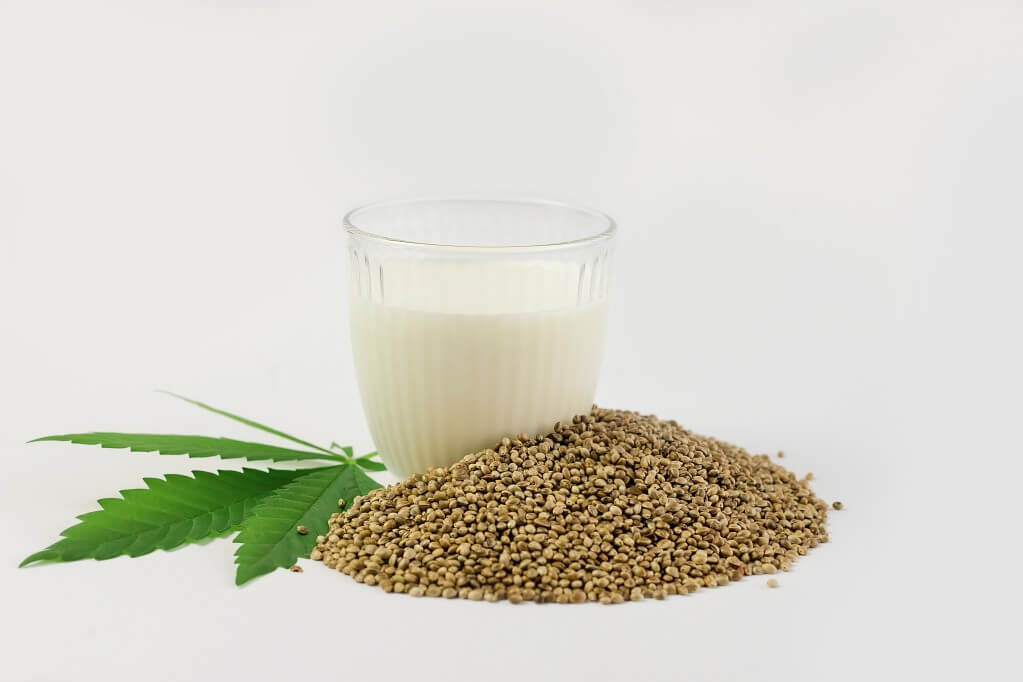
3. Hemp Milk
Hemp milk has a variety of nutrients, healthy fats, and high levels of protein. This makes it a top contender for healthiest non-dairy milk.
Hemp milks often contain high levels of calcium, as well as 10 amino acids.
Micronutrients like magnesium, zinc, and phosphorus, important for bone health, immunity, memory, and kidney function, can all be found in hemp milk. Also, it often has high levels of vitamin A.
Hemp milk is high in polyunsaturated fats, and low in saturated fats. Unflavored hemp milks are typically very low in calories, and they are low in carbohydrates. Hemp milk is a great option for those following low calorie diets, plant based diets, or low carb diets.
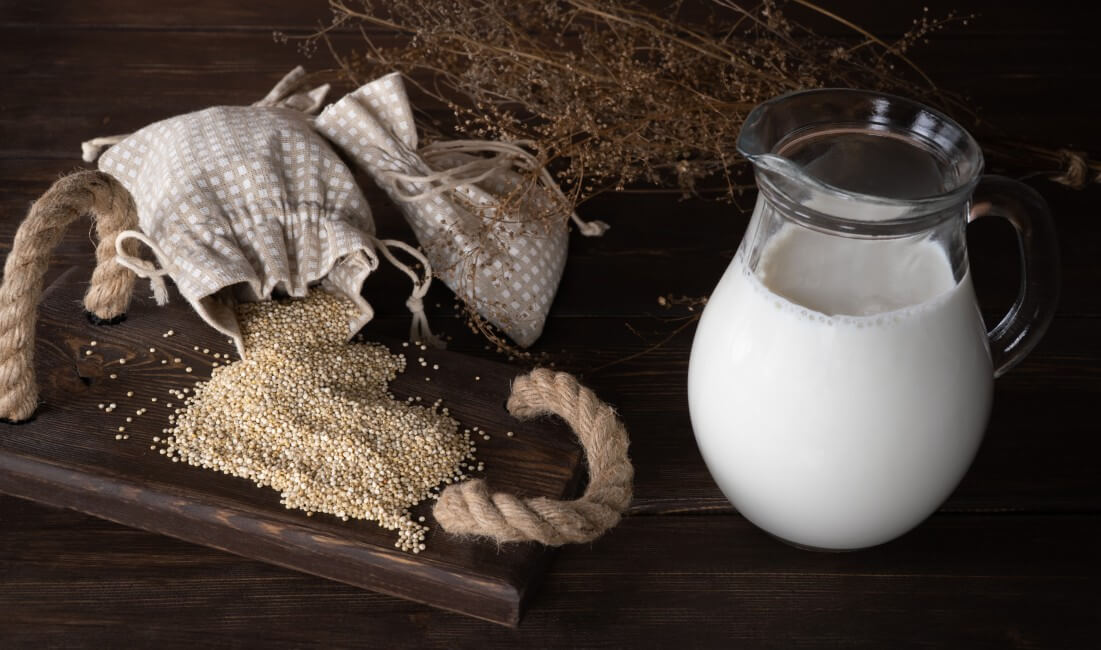
4. Quinoa Milk
Quinoa is an Andean whole grain seed with great nutrient content, which explains why it's used to make one of the healthiest non-dairy milks out there.
Although you may have never heard of quinoa milk, it is a good option for vegans and those on lactose or gluten free diets, and it is suitable for people with nut allergies.
In addition to being a low calorie option, quinoa milk contains 8 essential amino acids, magnesium, phosphorus, potassium, iron, fiber, and vitamin E.
Unlike many milks on this list, including cow milk, quinoa milk does contain fiber, which is very important for digestion and preventing constipation.
Quinoa milk is lower in calories than cow milk, but it has less protein. On the other hand, fortified versions have substantial amounts of nutrients.
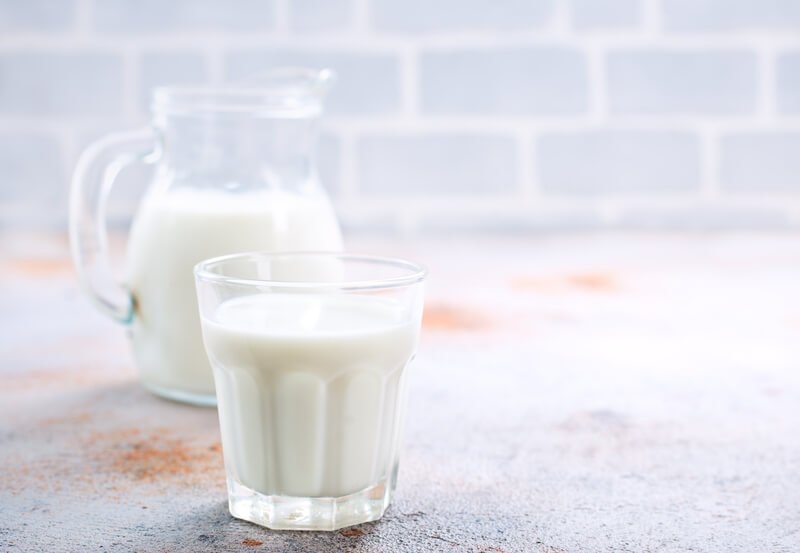
5. Flax Milk
For anyone looking for a low calorie and high calcium milk, including those allergic to nuts or intolerant of dairy or soy, flax milk is a great healthy non-dairy milk.
Flax milk can be fortified to include a variety of vitamins and other nutrients, and it is tasty!
One of the best parts of flax milk, besides its creamy texture and taste, is that it naturally includes omega-3.
Also, Alpha linoleic acid is found in flaxseeds, and can be beneficial for heart health, and the reduction of the risk of cancer, heart disease, and strokes.
Flax seeds can be beneficial to those watching their blood pressure and blood sugar levels.
Choosing an unsweetened flax milk will be the best option, and selecting one with extra protein (usually in the form of pea protein) can be helpful in weight loss and maintaining satiety, aka the feeling of fullness.
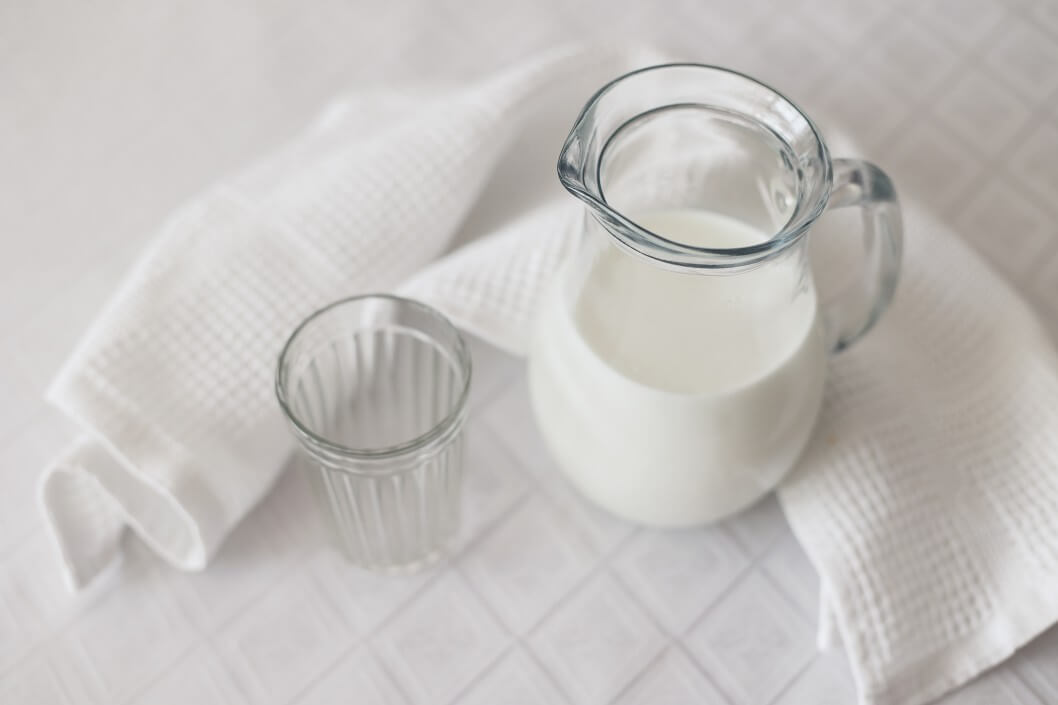
6. Rice Milk
Rice milk is the best choice for those mindful of allergens, as it is the least allergenic, making it a good option for use during school bake sales and office parties.
Rice milk is low in calories, but it is also low in protein. It is low in sodium and cholesterol free, but it is a high glycemic food, which can cause blood sugar spikes.
Rice milk has no saturated fat, while most fat from dairy milk is in the form of saturated fat.
Many varieties of rice milk are enriched with vitamins and nutrients. Some have calcium, vitamin D, vitamin B12, and vitamin A. When shopping, don't forget to look at the nutrition label and read it thoroughly, as only some product lines are enriched.

7. Spelt Milk
One uncommon non-dairy milk is spelt milk, but it may be a good one for you to check out!
Spelt is a variety of wheat indigenous to Central Asia, and it is used similarly to rice and other cereals. The nutrient content of spelt milk makes it a great healthy alternative to cow milk.
Spelt seeds contain zinc, copper, iron, magnesium, vitamin B1, and vitamin B9, and most spelt milk is enriched with vitamin D and calcium.
Spelt milk is very low in calories, but this milk variety is low in protein content, similar to that of almond milk. Additionally, spelt milk does contain gluten, making it a bad choice for those with celiacs disease or a gluten intolerance.
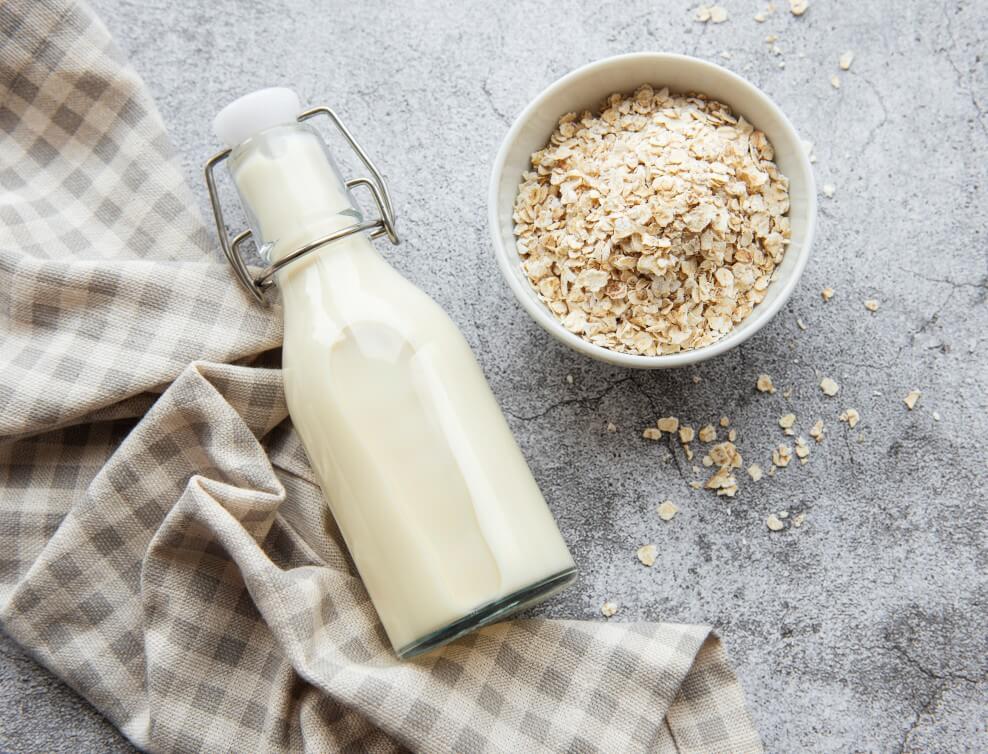
8. Oat Milk
Oat milk is one of the most popular non-dairy milks because of its creamy texture and delicious taste. It also can be healthy and has a variety of benefits.
Oat milk contains fiber and medium amounts of protein. This fiber is usually in the form of beta glucans, which are highly soluble and can be beneficial in improving the gut bacteria biome.
Most brands contain calcium and will be fortified with vitamins A, B, B12, and D. Some even have iodine.
Oat milk is lower in sugar and calories than dairy milk, making it a better option for some for weight loss. Sweetened and highly processed oat milks can contain oil additives and other processed sugars, which you may want to avoid.
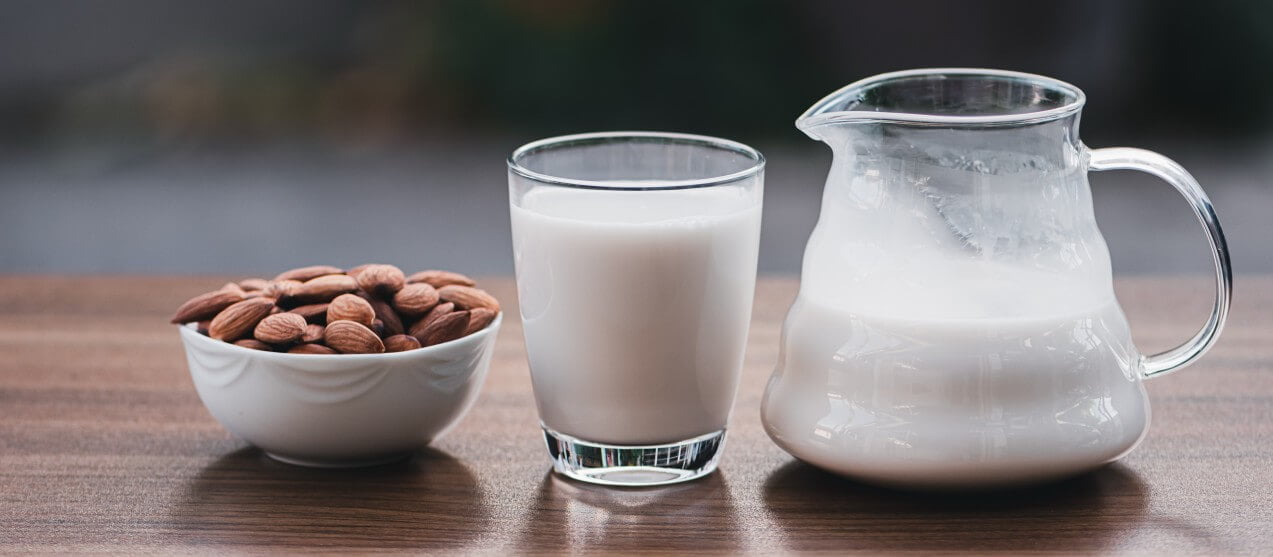
9. Almond Milk
Another amazing healthy non-dairy milk is almond milk. This milk alternative has been popular for many years, due to its taste, texture, and versatility. Not only is almond milk delicious, it can be good for you too!
Almond milk is one of the lowest calorie options on this list and it typically has very little fat.
For those on low calorie or low carb diets, this can be a great option. The reason that almond milk is not number one, however, is because it has very little protein.
Non fortified blends of almond milk already have naturally very high levels of vitamin E, far higher than other alternatives.
Vitamin E is important for healthy vision, skin, and reproduction. It also can have antioxidant properties. Fortified almond milk often contains phosphorus, an essential macronutrient important for healthy teeth and bone development.
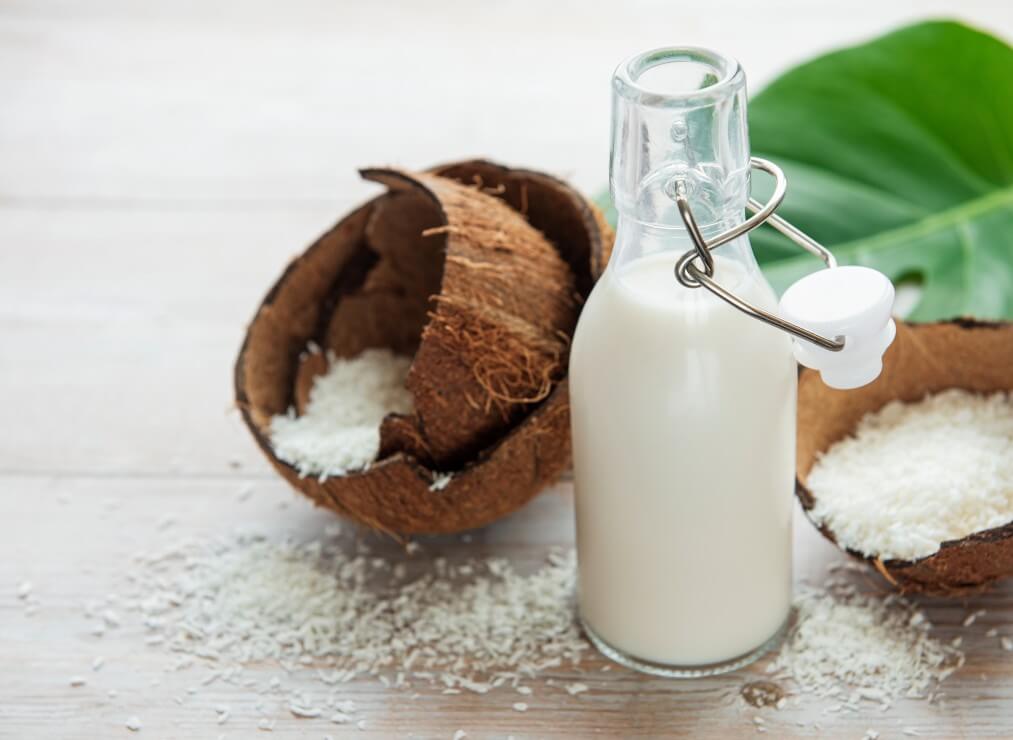
10. Coconut Milk
Coconut milk is a non-dairy milk that can be found in a thick or thin version. The thicker variety will have higher fat content and is delicious in baking, in creamy desserts, or in cooking, like when used in Indian curries.
Usually raw coconut milk will be found in a can, while a coconut milk beverages can be found in a shelf stable carton.
One difference from coconut milk to the rest on our list is that coconut milk contains medium chain triglycerides (MCTs), which can be linked to weight loss and increased insulin sensitivity, which in turn controls blood sugar levels.
Coconut milk drinks contain calcium, potassium, and are usually fortified with vitamins A, B12, and D2. They have very little protein and higher fat content, and this fat is saturated and can make the milk high in calorie content.
Final Thoughts
Soy milk and pea milk are the healthiest non-dairy choices for those looking to supplement their diet with a high protein cow milk alternative. You should choose a non-dairy milk that is fortified and enriched with added vitamins and minerals. The nutrition label of your chosen non-dairy milk should reflect your health goals and diet restrictions.
